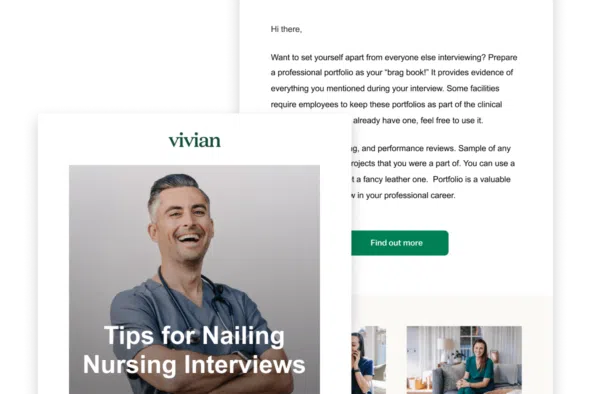Travel nurses and other temporary healthcare workers are used to fill temporary holes in staffing while the facilities hire new workers, or to help cover another staff member’s leave. Hospitals, long-term care facilities, home health systems, clinics, and many other sites hire travelers to help them fill their schedules. Travel nurses usually work for an agency and have a recruiter at that agency that is the liaison between the nurse and the hospital, or they work for the healthcare system’s internal agency. An example of this would be HealthTrust- the internal agency of travel nurses for HCA hospitals.
How Many Agencies Can Travel Nurses Work with at One Time?
Travel nurses can work with multiple agencies and recruiters when searching for a job. Travel nurses do not need to stay with the same agency and recruiter throughout their whole career, and can be working with multiple agencies at one time while looking for a new assignment. They just need to be sure that they aren’t submitted for the same job by different agencies.
A recruiter will submit a nurse to a job once they have verified the nurse meets the hiring requirements. Travel nurses can choose where they want to work, there are usually jobs available in all states, but must be licensed in the state where they are going to work, whether that be a single state nursing license, or compact RN license. They also must meet all of the agency and facility prerequisites for documentation before they can begin an assignment.
Travel nurses usually interview with someone at the hospital or facility after their application has been submitted and reviewed by the hiring unit. Once the facility hires the nurse, the nurse then has to find housing and figure out how they are going to get to the assignment location. Travel nurses can take agency-provided housing, but that usually takes a big chunk of pay out of their blended rate.
Travel Nurse Salary
Travel nurses are paid as ‘temporary workers’ and must meet a minimum distance from home requirement in order to be eligible for tax free stipends as part of their travel nursing pay package. If a nurse is eligible for stipends and can claim a permanent tax home, the pay packages are much different than a staff nurse pay package. The hourly taxable wage will most likely be low, usually around $20-30/hour. The rest of the pay is in tax-free stipends, resulting in a much higher ‘blended’ rate- usually at least $60/hour (but, the nurse is only being taxed on $20/hour).
How Long is a Travel Nursing Contract?
Most travel nurses work full time, and the contracts have traditionally lasted 13 weeks (although, the COVID-19 pandemic saw much shorter contracts during crisis). If you get the job you will work the length of the contract, and may or may not be offered to extend that contract further. The extension is always optional, never required. Travel nurses may also take unlimited time off between contracts, but that time is not paid.
Travel Nurse Experience Requirements
Travel nursing requires at least one year of paid clinical experience (requirements may change with different facilities) as a nurse. Some of the higher acuity specialties, like ICU, may require two years at many facilities. If this is your first time check out our guide to travel nursing careers.
Is travel nursing a career?
Yes! A lot of travel nurses travel for years before going back to a permanent staff position, and some just keep traveling! You gain so much experience as a traveler and it’s a great way to see all of the country!




